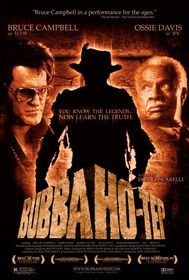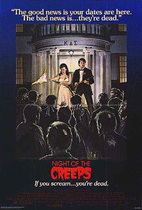Our editor-in-chief Nate Yapp is proud to have contributed to the new book Hidden Horror: A Celebration of 101 Underrated and Overlooked Fright Flicks, edited by Aaron Christensen. Another contributors include Anthony Timpone, B.J. Colangelo, Dave Alexander, Classic-Horror.com's own Robert C. Ring and John W. Bowen. Pick up a copy today from Amazon.com!
Bubba Ho-tep (2002)
If an ancient Egyptian mummy began to menace a retirement home in East Texas, what would he be called? Why, Bubba Ho-Tep of course! And who better to defeat them than JFK and the King of Rock and Roll? This epic battle is the subject of Bubba Ho-Tep, a delightful horror-comedy from director Don Coscarelli, starring Bruce Campbell and Ossie Davis. A film that knows when (and when not) to take itself seriously, Bubba Ho-Tep manages to carefully explore its main character, offer some very good laughs, and still have some poignant things to say. It's a charming little film that, while not inspiring chills, leaves the viewer with a chuckle and a smile.
In the lonely and nearly forgotten Shady Rest retirement home in Mud Creek Texas, an elderly Elvis Presley (Bruce Campbell) is living his last days as Sebastian Huff, an Elvis impersonator. His only friend is a man named Jack (Ossie Davis) who believes that he is actually John F. Kennedy. As the days drone tediously on, the residents begin dying at an alarming rate. Jack discovers that an ancient mummy has appeared in Mud Creek and is sucking the souls from the residents. Together, The King and the 35th President unite to defeat an ancient terror.
There are two aspects of this film’s script that make it special. The first and more surprising is that, for a film that has such a numerous and irreverent take on classic mummy stories, Ho-Tep is incredibly insightful about its characters. A great deal of time is spent on Elvis’s regrets, and how the elderly are tossed aside and forgotten. Early in the film, Elvis’s roommate dies, and when his daughter comes to collect his effects, she briefly looks at them and then throws them away (including her father’s Purple Heart). We also hear Elvis wondering if his wife and daughter would visit him if they knew he were still alive. Most of his time is spent sleeping, being patronized by the rest home staff, or contemplating the “growth on [his] pecker.” At one point, The King wearily concludes “Is there finally and really anything to life other than food, s**t and sex?” In another sad moment, he realizes that, for the elderly, “everything you do is either worthless or sadly amusing.” Even the horror-comedy greats like Re-Animator and Young Frankenstein don’t have such sad, observant dialogue. The thought put into this script (by Coscarelli, working from a short story by Joe R. Lansdale) would be enough on its own to make this a minor gem.
The other wonderful aspect of Ho-Tep is its biting sense of humor. The concept of the film is unique: two supposedly dead icons battling an ancient evil. The dialogue is such that you believe that Elvis is THE Elvis, and that the African-American Jack is really JFK (Jack explains this to Elvis by saying that the government dyed him to cover up the truth). While sad, most of Elvis’s lines about old age and his health are extremely funny, and most of the time Jack sounds like a Kennedy assassination theorist. Bubba Ho-Tep himself kills people and then sucks their souls from their buttocks. He also writes graffiti on the walls of a toilet stall while, Jack theorizes, excreting the remains of the souls he has devoured. Many of the film’s images share this bizarre sense of humor. Early on, Elvis does battle with a mammoth cockroach, armed with a fork and a bedpan. And, near the end, we see Elvis in a glittery white “Elvis” suit, and Jack, dressed in a beautiful three piece suit riding in his wheel chair, doing the classic, slow motion The Right Stuff walk. This film often can make one laugh out loud, making its perverse sense of humor is one of its greatest assets.
The magnificent casting of Bruce Campbell and Ossie Davis make this film a joyful experience. Bruce Campbell, in full Elvis sideburns and a huge (prosthetic) belly, has the voice of The King down perfectly. He even throws in a few “thank you, thank you very much”'s in to complete the disguise. He walks the tight rope between parody and sincere characterization, and shows us an Elvis who is tired of life, just counting the days until he dies, and then finds new life in helping Jack defeat Bubba Ho-Tep. We keep waiting for Campbell to go over the top and turn Elvis into Ash with sideburns, but he never comes close to puncturing his character. Bubba Ho-Tep would be a lesser film without him.
Ossie Davis is also absolutely indispensable to the film. Somehow, despite the absurdity of it all, he keeps us wondering if Jack is a senile old man or really JFK. His room is covered with mockups of Dealey Plaza and photos of Lee Harvey Oswald and other possible conspirators. Talking almost more like a Kennedy Assassination buff than a president, Davis slowly convinces us that he might actually be JFK by his total conviction and self-assuredness. Not only does he deliver the funniest line in the film (Elvis: “Look, man, President Johnson's dead.” Jack: “S**t. That ain't gonna stop him.”), but the smile on his face when he says “Wow” when reminiscing about Marylin Monroe is priceless. He doesn’t speak like JFK, but I’m sure he’d tell us that that is all part of the cover up. Ossie Davis, along with Campbell, makes Bubba Ho-Tep one of the funniest horror-comedies in some time.
The direction of Don Coscarelli is very good. He effectively uses extended flashbacks to tell Elvis’s backstory. Further, by never leaving the rest home (except in flashbacks) he accentuates the sense of isolation felt by the elderly, abandoned characters. While little of the film is actually frightening, he stages a scene with Bubba Ho-Tep walking the halls of the rest home in a very menacing manner, darkening the hall and shooting his walk in a sinister slow motion. Coscarelli’s direction is not perfect, relying to often on quick cuts and sped up film, which is more often annoying than shocking He also shows the briefest flashback of Bubba Ho-Tep’s origin, which weakens an already thin character. Nevertheless, these flaws are minor, and Coscarelli does an enjoyable and professional job in the director’s chair, highlighting the film's many virtues.
Bubba Ho-Tep is a gem. It combines a fantastic concept, savage humor, and unexpected depth in a way that has rarely been done before. This is a film that cares deeply about its characters yet uses their tragic situations to make irreverent statements about aging and personal worth. Coupled with two fabulous lead actors and a dynamic script, Bubba Ho-Tep is a modern horror-comedy classic.








